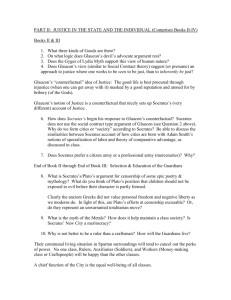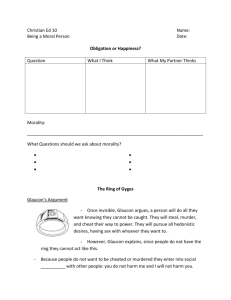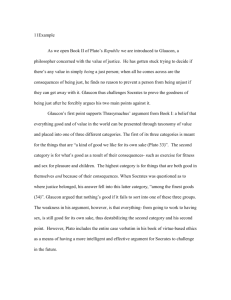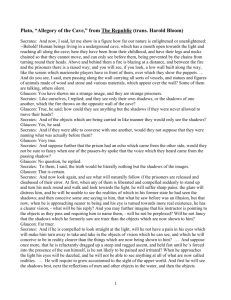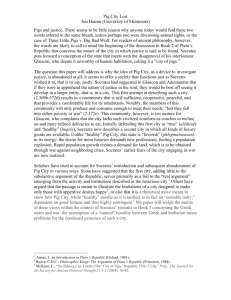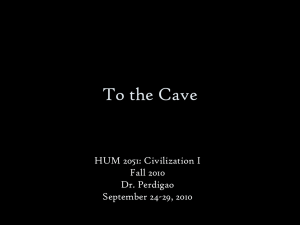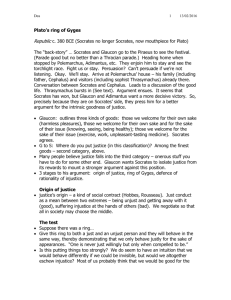Document 14118984
advertisement
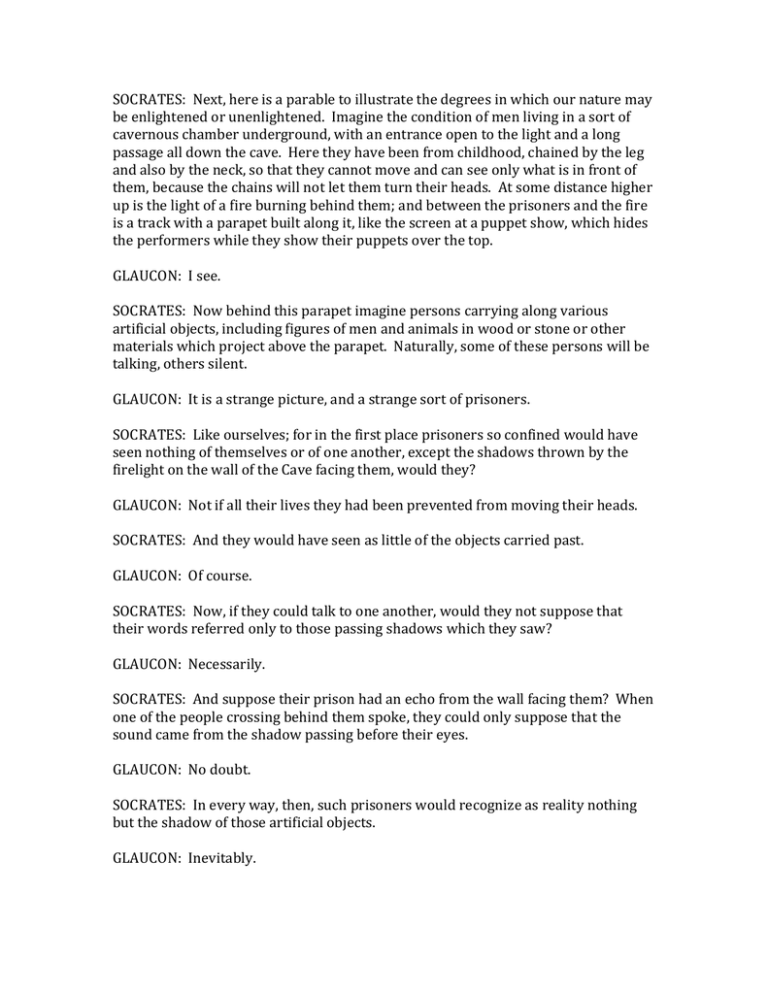
SOCRATES: Next, here is a parable to illustrate the degrees in which our nature may be enlightened or unenlightened. Imagine the condition of men living in a sort of cavernous chamber underground, with an entrance open to the light and a long passage all down the cave. Here they have been from childhood, chained by the leg and also by the neck, so that they cannot move and can see only what is in front of them, because the chains will not let them turn their heads. At some distance higher up is the light of a fire burning behind them; and between the prisoners and the fire is a track with a parapet built along it, like the screen at a puppet show, which hides the performers while they show their puppets over the top. GLAUCON: I see. SOCRATES: Now behind this parapet imagine persons carrying along various artificial objects, including figures of men and animals in wood or stone or other materials which project above the parapet. Naturally, some of these persons will be talking, others silent. GLAUCON: It is a strange picture, and a strange sort of prisoners. SOCRATES: Like ourselves; for in the first place prisoners so confined would have seen nothing of themselves or of one another, except the shadows thrown by the firelight on the wall of the Cave facing them, would they? GLAUCON: Not if all their lives they had been prevented from moving their heads. SOCRATES: And they would have seen as little of the objects carried past. GLAUCON: Of course. SOCRATES: Now, if they could talk to one another, would they not suppose that their words referred only to those passing shadows which they saw? GLAUCON: Necessarily. SOCRATES: And suppose their prison had an echo from the wall facing them? When one of the people crossing behind them spoke, they could only suppose that the sound came from the shadow passing before their eyes. GLAUCON: No doubt. SOCRATES: In every way, then, such prisoners would recognize as reality nothing but the shadow of those artificial objects. GLAUCON: Inevitably. SOCRATES: Now consider what would happen if their release from the chains and the healing of their unwisdom should come about in this way: suppose one of them set free and forced suddenly to stand up, turn his head and walk with eyes lifted to the light; all these movements would be painful, and he would be too dazzled to make out the objects whose shadows he had been used to seeing. What do you think he would say, if someone told him that what he had formerly seen was meaningless illusion, but now, being somewhat nearer to reality and turned towards more real objects, he was getting a truer view? Suppose further that he were shown the various objects being carried by and were made too say, in reply to questions what each of them was. Would he not be perplexed and believe the objects now shown to him to be not so real as what he formerly saw? GLAUCON: Yes, not nearly so real. SOCRATES: And if he were forced to look at the firelight itself, would not his eyes ache, so that he would try to escape and turn back to the things which he could see distinctly, convinced that they really were clearer than these other objects now being shown to him? GLAUCON: Yes. SOCRATES: And suppose someone were to drag him away forcibly up the steep and rugged ascent and not let him go until he had hauled him out into the sunlight, would he not suffer pain and vexation at such treatment, and, when he had come out into the light, find his eyes so full of its radiance that he could not see a single one of the things that he was now told were real? GLAUCON: Certainly he would not see them all at once. SOCRATES: He would nee, then, to grow accustomed before he could see things in that upper world. At first it would be easiest to make out shadows, and then the images of men and things reflected in water, and later on the things themselves. After that, it would be easier to watch the heavenly bodies and the sky itself by night, looking at the light of the moon and stars rather than the Sun and the Sun’s light in the daytime. GLAUCON: Yes, surely. SOCRATES: Last of all, he would be able to look at the Sun and contemplate its nature, not as it appears when reflected in water or any alien medium, but as it is in itself in its own domain. GLAUCON: No doubt. SOCRATES: And now he would begin to draw the conclusion that it is the Sun that produces the seasons and the course of the year and controls everything in the visible world, and moreover is in a way the cause of all that he and his companions used to see. GLAUCON: Clearly he would come at last to that conclusion. SOCRATES: Then if he called to mind his fellow prisoners and what passed for wisdom in his former dwelling place, he would surely think himself happy in the change and be sorry for them. They may have had a practice of honoring and commending one another, with prizes for the man who had the keenest eye for passing shadows and the best memory for the order in which they followed or accompanied one another, so that he could make a good guess as to which was going to come next. Would our released prisoner be likely to covet those prizes or to envy the men exalted to honor and power in the Cave? Would he not feel like Homer’s Achilles, that he would far sooner “be on earth as a hired servant in the house of a landless man” or endure anything rather than go back to his old beliefs and live in the old way? GLAUCON: Yes, he would prefer any fate to such a life. SOCRATES: Now imagine what would happen if he went down again to take his former seat in the Cave. Coming suddenly out of the sunlight, his eyes would be filled with darkness. He might be required once more to deliver his opinion on those shadows, in competition with the prisoners who had never been released, while his eyesight was still dim and unsteady; and it might take some time to become used to the darkness. They would laugh at him and say that he had gone up only to come back with his sight ruined; it was worth no one’s while even to attempt the ascent. If they could lay hands on the man who was trying to set them free and lead them up, they would kill him. GLAUCON: Yes, they would. SOCRATES: Every feature in this parable, my dear Glaucon, is meant to fit our earlier analysis. The prison dwelling corresponds to the region revealed to us through the sense of sight, and the firelight within it to the power of the Sun. The ascent to see the things in the upper world you may take as standing for the upward journey of the soul into the region of the intelligible; then you will be in possession of what I surmise, since that is what you wish to be told. Heaven knows whether it is true; but this, at any rate, is how it appears to me. In the world of knowledge, the last thing to be perceived and only with great difficulty is the basic Form of Goodness. Once it is perceived, the conclusion must follow that, for all things, this is the cause of whatever is right and good; in the visible world it gives birth to light and to the lord of light, while it is itself sovereign in the intelligible world and the parent of intelligence and truth. Without having had a vision of this Form no one can act with wisdom, either in his own life or in matters of state. GLAUCON: So far as I can understand, I share your belief. SOCRATES: Then you may also agree that it is no wonder if those who have reached this height are reluctant to manage the affairs of men. Their souls long to spend all their time in that upper world – naturally enough, if here once more our parable holds true. Nor, again, is it at all strange that one who comes from the contemplation of divine things to the miseries of human life should appear awkward and ridiculous when, with eyes still dazed and not yet accustomed to the darkness, he is compelled, in a law court or elsewhere, to dispute about the shadows of justice or the images that cast those shadows, and to wrangle over the notions of what is right in the minds of men who have never beheld Justice itself. GLAUCON: It is not at all strange. SOCRATES: No; a sensible man will remember that the eyes may be confused in two ways – by a change from light to darkness or from darkness to light; and he will recognize that the same thing happens to the soul. When he sees it troubled and unable to discern anything clearly, instead of laughing thoughtlessly, he will ask whether, coming from a brighter existence, its unaccustomed vision is obscured by the darkness, in which case he will think its condition enviable and its life a happy one; or whether, emerging from the depths of ignorance, it is dazzled by excess of light. If so, he will rather feel sorry for it; or, if he were inclined to laugh, that would be less ridiculous than to laugh at the soul which has come down from the light. GLAUCON: That is a fair statement.
